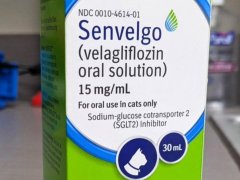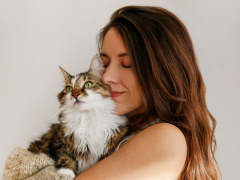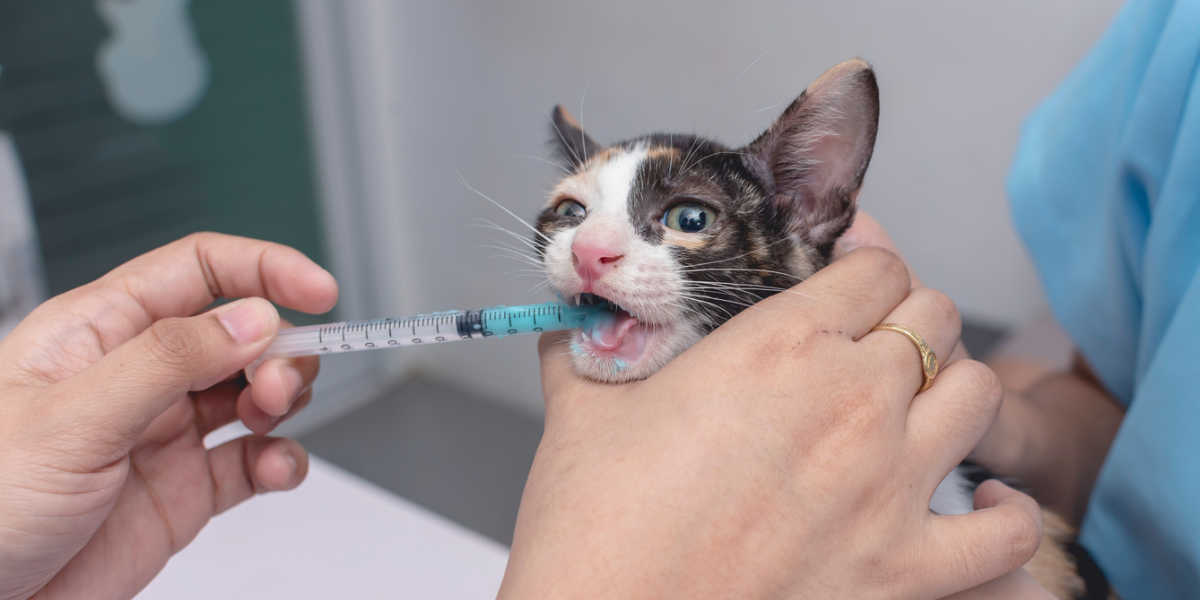
Imodium is one common brand name for the over-the-counter anti-diarrheal medication loperamide. Using Imodium to treat diarrhea in cats is controversial. It carries a higher risk of side effects; other treatment options for diarrhea might be safer and more effective.
In this article, we’ll address how Imodium for cats works, its potential side effects, some safety precautions, and some frequently asked questions.
Imodium for Cats Overview

Imodium for Cats
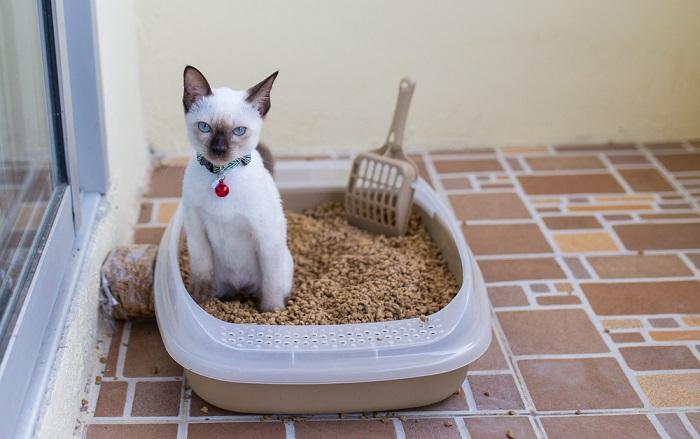
Imodium is only approved for us in humans, but veterinarians can legally prescribe it to use in cats in an off-label manner.
Imodium, or loperamide, is classified as an opiate antidiarrheal medication. It acts on the circular and longitudinal muscles of the gut to reduce gastrointestinal motility and forward motion of digestive contents. It does this by binding to certain opioid receptors in the GI tract.
Although Imodium could be considered related to other opioid medications, it does not possess any pain-relieving qualities.
In veterinary patients, Imodium is far more commonly administered to dogs. It is used to address either short-term uncomplicated diarrhea or intractable diarrhea with a known cause (such as diarrhea caused by chemotherapy, for example).
Imodium is not typically recommended to treat diarrhea in cats if the cause is unknown. There can be many causes of diarrhea but it is often the body’s way of showing that something is out of balance. Imodium is not helpful in treating diarrhea with infectious, parasitic, or chronic inflammation causes. For these types of conditions, there are better, more direct treatments available.
In many cases, diarrhea can occur secondary to another internal process in a cat. It is very important to work with a veterinarian to determine the cause of a cat’s diarrhea for the best treatment, instead of symptomatic treatment of diarrhea alone.
Using Imodium for cats is controversial due to it carrying a greater risk of side effects than other drugs. These side effects include constipation and hyperexcitement. It is also controversial because accurate and safe dosing of Imodium in very small patients can be challenging.
Also Read: 4 Best Fiber Supplement For Cats With Diarrhea
What Imodium Does for Cats
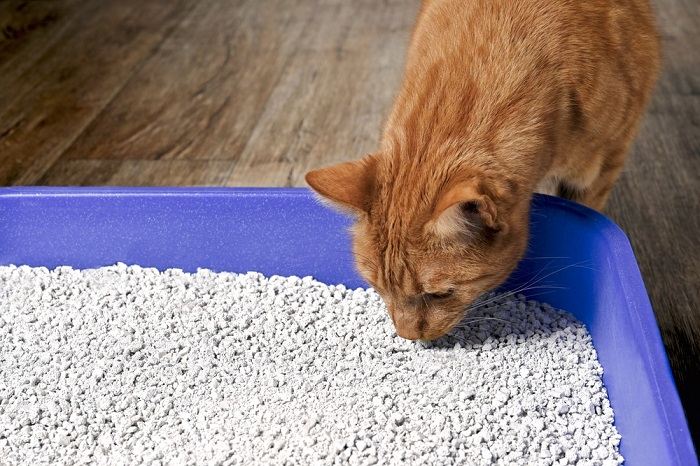
Some veterinarians prescribe Imodium to treat certain types of diarrhea in cats.
Imodium can be used in an off-label manner to address some types of diarrhea in cats. Some veterinarians might feel comfortable using Imodium for cats when certain types of diarrhea have been ruled out. Sometimes it might be used by a veterinarian when the benefits of using it appear to outweigh the risk of side effects.
But in many cases, your veterinarian might not recommend using Imodium and will advise other treatments for diarrhea. This will depend on the cause of the diarrhea, sometimes based on additional testing such as for parasites, infection, or other health conditions like food allergies, toxins, or other contributing factors.
Also Read: The 9 Best Cat Foods For Diarrhea
Side Effects of Imodium for Cats
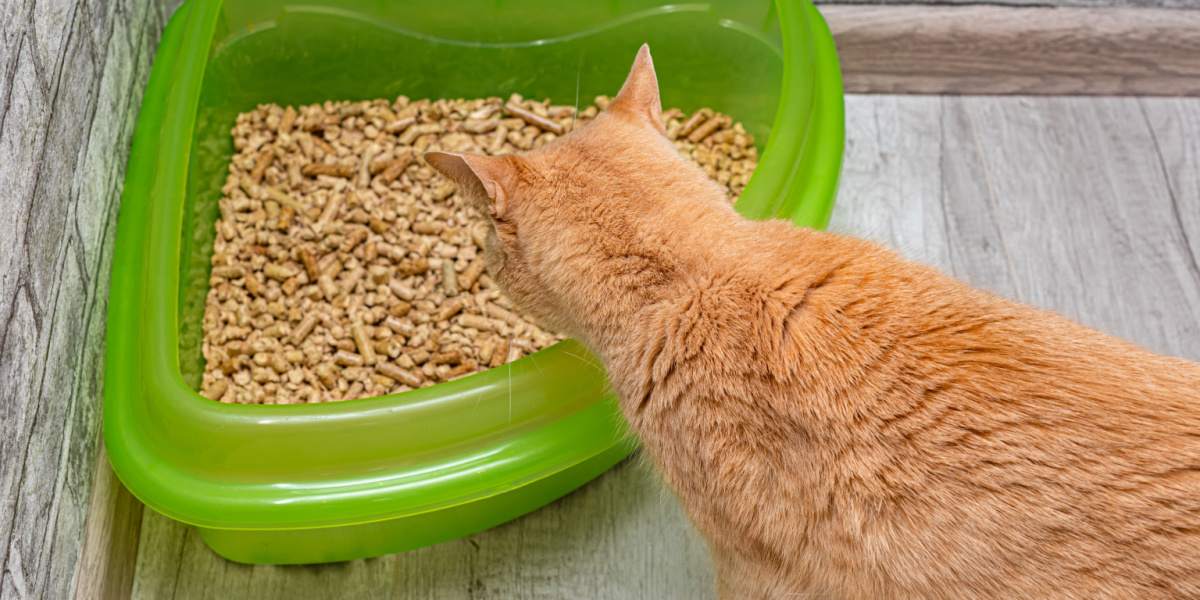
The two most common side effects seen when using Imodium in cats include hyperexcitability and constipation.
Generally, the main side effects of using Imodium to treat a cat’s diarrhea are excitatory behavior and constipation.
According to the Merck Veterinary Manual, the more specific adverse effects of using Imodium to treat cats include paralytic ileus (a complete stop of intestinal transit motion), toxic megacolon (where the colon becomes impacted with feces and a secondary bacterial infection also develops), pancreatitis, and central nervous system effects.
In a 2010 article published for DVM360, researchers took a closer look at using Imodium for cats. They found that Imodium, as well as diphenoxylate, another opiate antidiarrheal, are rarely appropriate in feline patients. This is exactly due to adverse reactions, including respiratory depression and excitatory behavior.
A newer concern about Imodium for cats is related to a genetic mutation called MDR1. This gene mutation has been known in dogs since about 2001, primarily affecting herding dog breeds like Collies. This gene mutation can make these dogs very sensitive to certain drugs, including ivermectin and loperamide (Imodium), causing seizures.
A test has been available to detect this mutation in dogs for some time. Recently, in 2022, the same research team at Washington State University that discovered and developed the test for dogs developed a similar MDR1 detection test for cats.
The research team determined that although there are no breed predilections known so far in cats, this genetic mutation might occur in about 4% of the feline population. While the percentage risk is very low, even an exact dose of Imodium could cause severe neurologic effects in a cat with this mutation.
Lastly, the use of Imodium should especially be avoided in any cats with concurrent disease. This is especially true of liver disease, GI motility disorders like constipation or megacolon, or pancreatitis. Imodium is primarily metabolized and excreted through the liver and bile. It might exacerbate existing motility issues and contribute to pancreatitis flares.
Because of these concerns, it’s very important to not dose your cat with Imodium at home. Discuss administering the drug with your veterinarian.
If you are ever concerned that your cat might have developed side effects while using Imodium or if an overdose is suspected, make sure to contact your veterinarian, the ASPCA Animal Poison Control Center (888-426-4435), or Pet Poison Helpline (855-764-7661) immediately for further advice.
Also Read: Vet Approved Cat Stool Chart: Decoding Your Cat’s Poop
Imodium Dosage for Cats
Because the use of Imodium in cats is controversial and side effects are a real concern, specific dosing is not provided. If you feel that your cat could benefit from Imodium, it is best to touch base with your vet. Some vets might have a level of experience and comfort using Imodium for your cat. Still, many might recommend other testing or treatment options for your cat’s diarrhea.
Since Imodium is over the counter and widely available with many folks having it on hand at home, some information is provided about dosing limitations and safety precautions to aim to reduce the risk of adverse events.
In most cases, the 2 milligram tablets should be avoided in cats. If Imodium is used in a cat at all, a very low dose is utilized and even ¼ of a tablet might be too high of a dose and could increase the likelihood of a drug reaction.
Veterinarians who are comfortable dosing Imodium for cats are more likely to use one of the liquid forms. This helps provide the most accurate dosing. In these cases, the exact weight of your cat is needed to provide the most accurate dose.
With either of the liquid concentrations of Imodium available, doses for most cats should likely not exceed 1 to 1.5 milliliters, depending on weight. However, this does NOT imply that this is a safe dose range to use for your cat.
Also Read: How To Tell If A Cat Is Straining To Poop Or Pee
Imodium for Cats: Final Thoughts
Imodium for cats, also known generically as loperamide, is an antidiarrheal medication. However, its use is controversial in cats. Use of Imodium carries a high risk of hyperexcitement and agitation behavior as well as other effects. These side effects can include constipation, respiratory depression, and pancreatitis. Some veterinarians might be comfortable with its use and dosing, but many might discuss other alternatives for treating diarrhea in cats.
Drug Dosing Disclaimer: We are only able to provide doses for medications that are FDA approved for use in cats and only as the label guidelines dictate. For medications that are used off-label we can only provide guidelines and safety information for use. Safe and appropriate dosing for off-label medications can only be determined by a primary care veterinarian.
We encourage you to work with your veterinarian to determine if a particular medication is appropriate for your cat. Changing or adjusting a dose for your cat on your own without consulting with a veterinarian can carry risk. We do not encourage use of medications prescribed for human use in pets without first consulting with a primary care veterinarian.
Frequently Asked Questions
Is it safe to give Imodium to cats?
The use of Imodium is controversial in cats due to its risk of side effects. Dosing can also be challenging as even small fractions of the widely available 2 milligram tablets might be too high for cats.
It is best to contact your veterinarian if your cat has diarrhea to see if Imodium could be an option and to discuss accurate dosing based on your cat’s weight.
How much Imodium can a cat take?
Due to the risk of adverse effects, dosing of Imodium should be done through a primary veterinary care provider and be as accurate as possible based on the cat’s weight. The liquid forms of Imodium can be dosed most accurately. The 2 milligram tablets should be avoided in most cases, as even fractions of a tablet may be more likely to cause adverse reactions.
What can I give my cat for diarrhea?
Diarrhea can have many causes, so it is very important to narrow them down and achieve a diagnosis through your veterinarian. This way, the proper treatment can be provided.
Some minor causes of diarrhea might resolve on their own, but any signs of diarrhea persisting for more than 24 hours, or diarrhea accompanied by other signs of illness, should be assessed as soon as possible by a veterinarian.
Can I give my cat Imodium for diarrhea?
Due to the higher risk for reactions to this drug in cats, loperamide (Imodium) should not be dosed at home without first consulting with a primary care veterinarian. In many cases, other testing and treatments for diarrhea will be advised.


